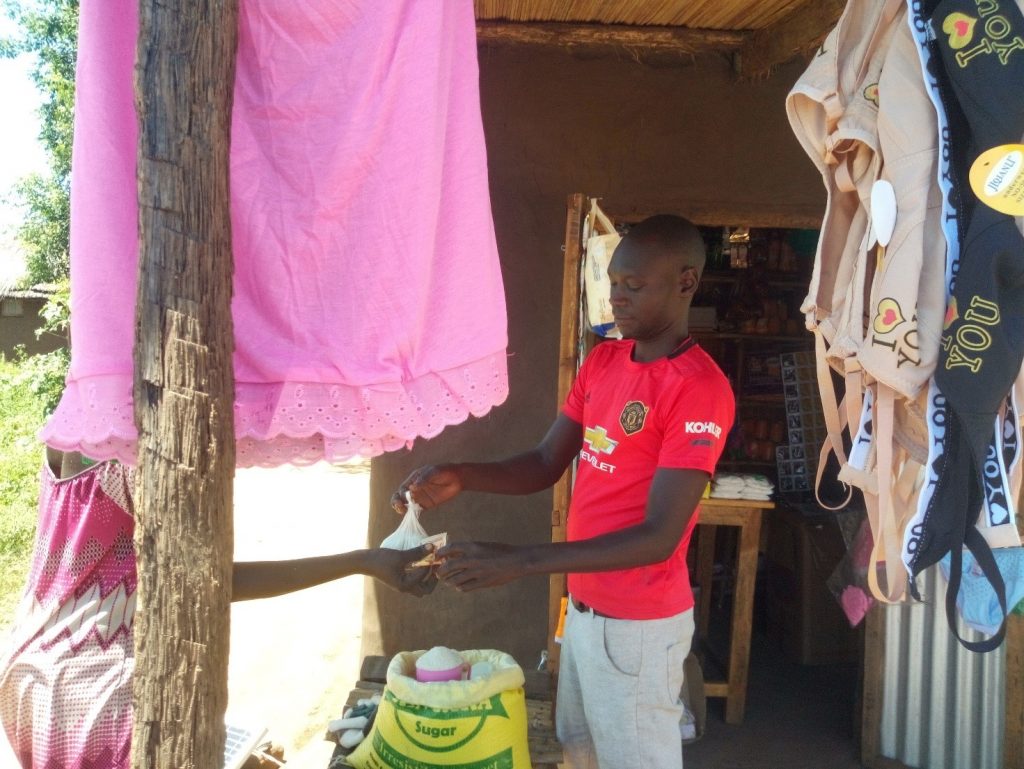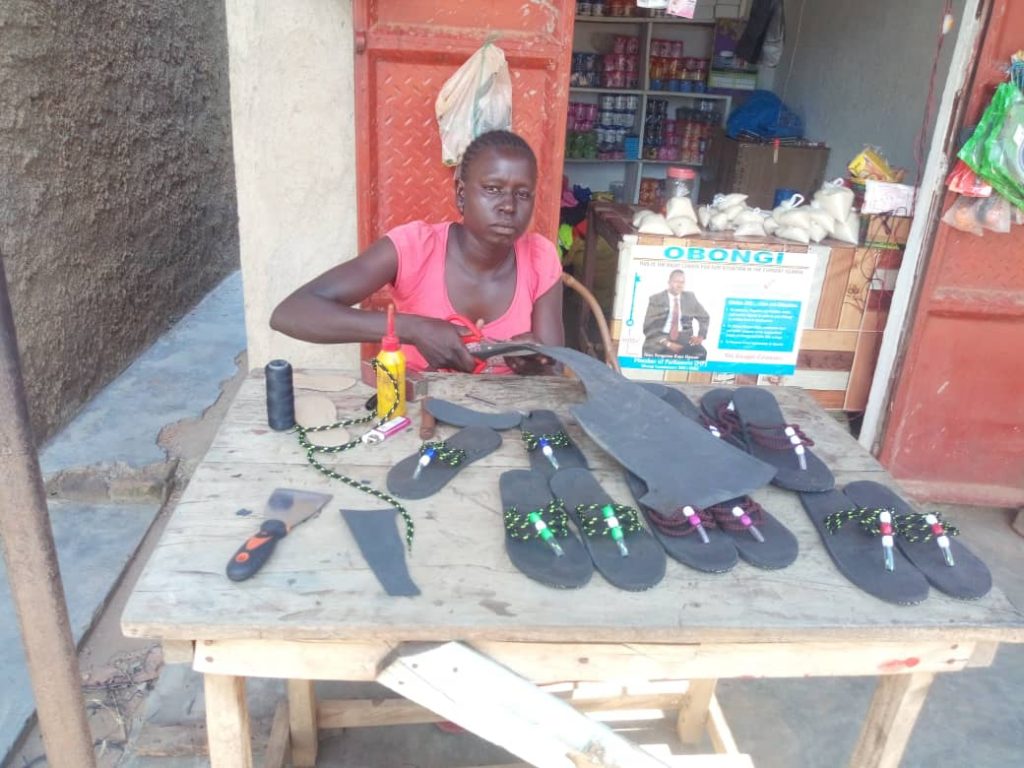Ugandan youths and refugees trained in Business and Vocational Skills
Finn Church Aid with partner Enabel has provided Ugandan and refugee youth in Palorinya settlement with necessary business understanding and vocational skills to find opportunities for sustainable livelihoods.
The war in South Sudan forced Alex Lojuan, 27, to flee his home and settle in Palorinya Refugee settlement, located in Obongi district in the West Nile sub-region of Uganda. He is one of the 512 youth that enrolled for the GIZ-ENABEL funded project implemented by Finn Church Aid (FCA) in the Palorinya refugee settlement.
“My father died during the war and as the eldest child in the family, I had to take on the mantle of providing for the family. These were the hardest moments of my life, fending for a family in a foreign land,” Alex says.

Alex started laying bricks for income and later got the opportunity to work with Lutheran World Federation (LWF) as a casual worker, distributing soap to refugees during the monthly distribution of food rations and household items in settlements. While at LWF, he received information about the FCA Business and Technical Vocational Education Trainings (BTVET).
“As luck would have it, I was enrolled as one of the FCA business skills trainees. Although, I am yet to finish the business training course, what I have learned so far in the first two modules has instilled in me a positive mindset for success,” Alex says.
Enhanced youth employability
The project ‘Promoting Youth Employability through Enterprise and Skills Development’ (PROYES) began in October 2019 and ended in May 2021. It sought to enhance profitable employment opportunities for refugee and host community youths through skills training and business development support, by equipping the youth with demand-driven vocational and business skills for fluent transition into working life in employment or self-employment.
During the project, FCA trained and mentored young people in Business Start-up and Management and in vocational skills like hairdressing, sandal making, carpentry, tailoring and building construction.
Backed by the training and skills received from the FCA business class training, in March 2020 Alex started up a retail business with the money saved from bricklaying and casual work.
“I used my 300,000 Ugandan Shillings savings to start a retail shop in Odraji Village, Zone 1 in Palorinya settlement. Within seven months, my business capital had doubled. This is in spite of the COVID-19 pandemic situation that has affected most businesses,” Alex says.
“I run my shop with proper business principles learned during the FCA training. I have a business plan, I negotiate with suppliers to get the best deals, practice marketing of my goods, and deliver great customer service in my business,” he adds.
Alex earns a weekly profit of over 30,000 Ugandan Shillings (UGX) and with this money, he is able to take care of his extended family. He also bought bicycle for himself and put up a temporary structure that houses his retail shop.
Linking learning to earning
In a bid to increase employability chances of the youth trained, FCA provided start-up kits to the trainees who completed the course. The organisation also linked the trainees to available employment opportunities.
By end of the project period, 153 trainees, including 86 males and 67 females, were employed either by the private sector entities where they had attended industrial training or became self-employed.
Gordon Chiria, a 26-year-old Ugandan living in Obongi town managed to set up his dream business after the training.
“I used to grow and sell maize and other crops to support my family. This business wasn’t successful because I failed to maintain it. After FCA’s training, I started a retail business with a capital of UGX 300,000. Currently I make sales worth UGX 80,000 per day and much more on market days,” Gordon says.
Using his business profits, Gordon managed to buy two goats and support his family. He plans to expand his business to both retail and wholesale. “I appreciate Enabel and FCA’s efforts towards making the livelihood of Obongi community youths better,” he adds.
Focus also on young women’s skills
The project also supported female youths. More than half, 53 % of all beneficiaries were females that benefited from the six skills trades under the project.
FCA supported female participation by establishing four child daycare centres and also facilitated customised career guidance, counselling and life skills training to enable female trainees appreciate the trainings and build their resilience to complete the course.
Esther Kuyang, 25-year-old South Sudanese refugee came to Palorinya refugee settlement with her family in January 2017. “My family and I were depending on the limited resources provided by World Food Programme. The food rations provided were not always enough, yet it was quite hard to get supplementary food due to lack of a source of income,” she recounts.
“While I was still pondering about what to do to take care of my family, FCA came to my aid. With their support, I enrolled for a business entrepreneurship course at Belameling Vocational Training Centre,” Esther tells.
“I had previously been trained by FCA in sandal making. Due to the lack of start-up capital, I was yet to put that skill into practice. During the business training under the FCA-Enabel project, I learned that my real capital was my brain. I immediately started to think of ways to get capital to rejuvenate my previously acquired skills of sandal making.”

“In mid-July 2020, I got a loan of UGX 170,000 from my friend and bought some basic materials such as rubber, thread, beads, for starting a sandal making business. With the business skills acquired in the training like record keeping, marketing and proper accounting, my business started growing. Within two months, I grew my business capital to UGX 200,000. On average, I earn a profit of UGX 28,000 weekly. I am still paying off my loan and I will keep reinvesting the profits in the business. I am also saving with Vision Savings Group, our FCA–Enabel Internal lending group,” she adds.
Esther is the chairperson of the savings group that was formed in January 2020 under the support of FCA-Enabel project. So far she has saved 75,000 shillings with this group. She also bought a bicycle, which facilitates her movements. Esther plans to buy more tools and equipment’s for sandal making, especially those that she currently lacks. She also plans on expanding the business and opening more branches in other trading centres to generate more income.
Text: Linda Kabuzire